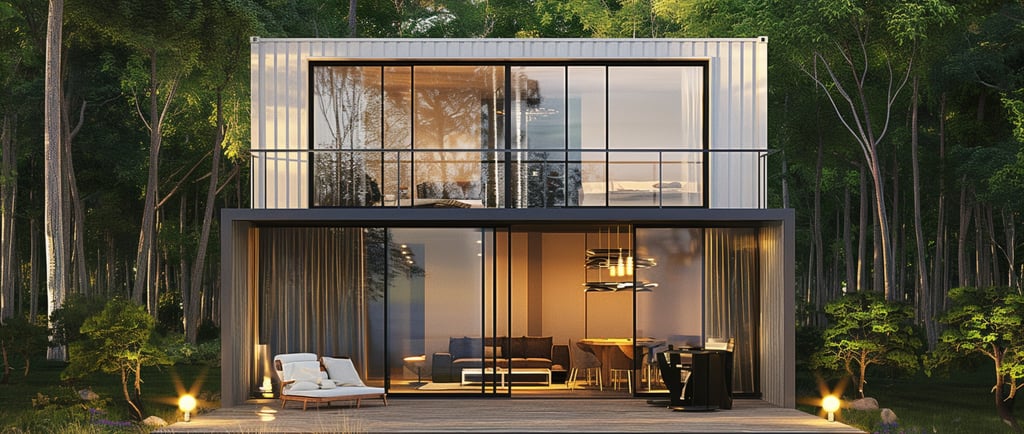Transforming Shipping Containers into Airbnb Rentals: The 2025 Guide


Short-term rental demand is booming, and creative hosts across the USA are seizing the opportunity to transform the humble shipping container into profitable, stylish Airbnb listings. If you’ve ever dreamed of turning a container home into a revenue-generating guest experience, this 2025 guide will help you navigate the costs, design decisions, legal considerations, and practical steps to succeed.
Shipping containers offer the perfect foundation for a unique, durable, and eco-friendly vacation rental, but only if you plan smart. Let’s break down everything you need to know about launching a container house in USA as an Airbnb-ready unit.
Why Use a Container House for Airbnb?
Affordability — Compared to traditional construction, a container house can cost 20–40% less per square foot, giving you a higher return on investment.
Speed of build — You can transform a container home in 4–8 months instead of 12 months or longer for standard builds.
Unique guest appeal — Travelers love novelty and style, and a container house stands out beautifully on Airbnb listings, giving you a competitive edge.
Sustainability — Reusing shipping containers aligns with eco-tourism values and supports the growing trend of green travel.
Modular expansion — You can start with a single unit and add more over time, scaling your Airbnb business gradually.
What You’ll Need to Budget
Container purchase & delivery
Expect $4,000–$7,000 per 40-ft container in 2025
Delivery can cost $500–$2,000 depending on site
Site preparation & foundation
Gravel or pier foundation: $2,000–$5,000
Concrete slab: $8,000–$15,000
Structural modifications
Cutting, welding, reinforcements: $5,000–$15,000 per unit
Insulation & weatherproofing
Spray foam or rigid board: $4,000–$10,000
Exterior siding or paint: $3,000–$10,000
Interior build-out
Electrical, plumbing, HVAC: $10,000–$25,000
Flooring, drywall, cabinetry, bath/kitchen: $15,000–$30,000
Permits & fees
Building permits: $1,000–$5,000
Engineering/design: $5,000–$12,000 or save with ready-made container home plans
Furnishings & decor
Beds, linens, appliances, styling: $5,000–$10,000
Overall, you should expect to budget between $60,000 and $120,000 for a single-unit container Airbnb, fully finished and furnished, in most U.S. regions.
How to Stand Out on Airbnb
After you build, success comes down to guest experience. Here’s how to make your container house shine:
Create an eye-catching listing — High-quality photos and a warm, human description sell bookings. Highlight the sustainable story behind the container home.
Emphasize amenities — Guests expect fast WiFi, good water pressure, quality beds, and efficient heating/cooling.
Add unique touches — Think fire pits, rooftop decks, or reclaimed wood accents for a memorable vibe.
Professional cleaning & maintenance — Plan for a reliable turnover crew and robust waste and plumbing systems.
Automate where you can — Smart locks, self-check-in, and security cameras at exterior doors help manage remote guests efficiently.
Legal & Regulatory Considerations
It’s essential to check with your local planning and zoning office, since short-term rentals and container-based structures both come with rules. Here are key steps:
Confirm short-term rental zoning
Verify container construction codes and wind/seismic standards
Check whether you need special fire-safety permits for metal structures
Be aware of parking requirements for guests
Budget for insurance tailored to short-term rentals.
Pro tip: Always get your plans engineered, and submit them to your local building department early. Ready-to-go, code-compliant plans can save you thousands — check out these vetted container home plans.
What Makes a Container Home a Great Airbnb?
Durability — Steel structure resists pests, mold, and severe weather
Customizable — Easily personalize to suit your local Airbnb market
Compact but stylish — Perfect for guests looking for modern, efficient spaces
Sustainable — Attracts eco-conscious travelers willing to pay a premium
With the rise of travelers seeking unique stays, a container house in USA can easily stand out from the cookie-cutter cabins and boring suburban homes.
Design Tips for Airbnb-Ready Container Homes
Include large windows or sliding glass doors to maximize natural light
Plan an outdoor patio or roof deck — guests love outdoor hangouts
Incorporate minimalist but durable finishes for easy cleaning
Use built-in beds and benches to save space
Choose neutral color palettes, then accent with local art or handmade decor
Real-World Case Study
One California couple turned a single 40-foot container into a 320 sq ft Airbnb studio, spending $72,000 all-in, including permits and furnishings. They consistently book at $140 per night and achieve an average 80% occupancy rate, paying back their investment in under 3 years. Their top guest reviews mentions
Unique design
Eco-friendly mission
Fast WiFi
Comfort and quality finishes
Their secret? A professional floor plan, reliable local contractor, and a focus on guest experience.
How to Get Started
Here’s your step-by-step roadmap to transform a shipping container into an Airbnb:
Research your local short-term rental regulations
Choose a quality shipping container from a local supplier
Invest in professional or ready-made container home plans
Get permits and inspections in place
Hire skilled trades for welding, HVAC, and electrical
Finish out the interiors with durable, easy-to-clean materials
Style your container home for maximum guest appeal
Photograph and list on Airbnb
Market through social media, local tourism boards, and repeat guests
Final Thoughts
Transforming a shipping container into an Airbnb is one of the smartest, most creative ways to tap into the growing short-term rental market in 2025. With proper planning, you can create a durable, stylish, and sustainable guest space that pays for itself in just a few years.
If you’re serious about starting your own container-based rental, don’t underestimate the value of solid plans, professional trades, and a carefully researched budget. Done right, your container house can be both a personal dream project and a reliable income source.
👉 Ready to get started? Check out these container home plans to launch your Airbnb adventure today
